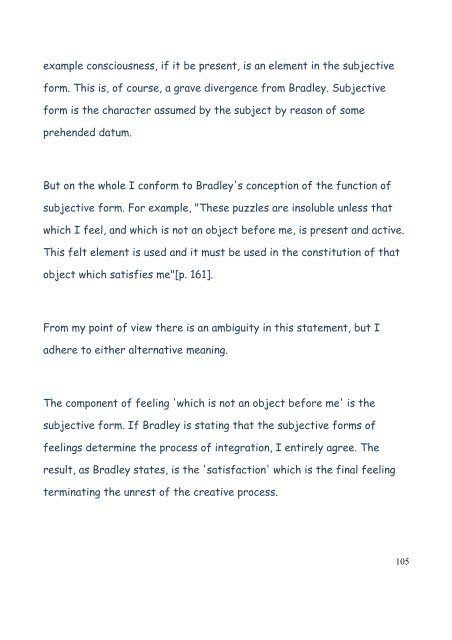Christian Thomas Kohl The Metaphysical Foundations of Buddhism and Modern Science
Christian Thomas Kohl The Metaphysical Foundations of Buddhism and Modern Science
Christian Thomas Kohl The Metaphysical Foundations of Buddhism and Modern Science
You also want an ePaper? Increase the reach of your titles
YUMPU automatically turns print PDFs into web optimized ePapers that Google loves.
example consciousness, if it be present, is an element in the subjective<br />
form. This is, <strong>of</strong> course, a grave divergence from Bradley. Subjective<br />
form is the character assumed by the subject by reason <strong>of</strong> some<br />
prehended datum.<br />
But on the whole I conform to Bradley's conception <strong>of</strong> the function <strong>of</strong><br />
subjective form. For example, "<strong>The</strong>se puzzles are insoluble unless that<br />
which I feel, <strong>and</strong> which is not an object before me, is present <strong>and</strong> active.<br />
This felt element is used <strong>and</strong> it must be used in the constitution <strong>of</strong> that<br />
object which satisfies me"[p. 161].<br />
From my point <strong>of</strong> view there is an ambiguity in this statement, but I<br />
adhere to either alternative meaning.<br />
<strong>The</strong> component <strong>of</strong> feeling 'which is not an object before me' is the<br />
subjective form. If Bradley is stating that the subjective forms <strong>of</strong><br />
feelings determine the process <strong>of</strong> integration, I entirely agree. <strong>The</strong><br />
result, as Bradley states, is the 'satisfaction' which is the final feeling<br />
terminating the unrest <strong>of</strong> the creative process.<br />
105


















